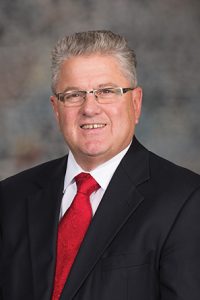Medical licensure compact participation sought
A bill that would clear the way for qualified physicians to practice in other states through participation in an interstate compact was heard Jan. 19 by the Health and Human Services Committee.

Seward Sen. Mark Kolterman, sponsor of LB61, said Nebraska participation in the compact would increase health care accessibility for patients in underserved and rural areas. The compact would not change the state’s existing medical licensure requirements, he said, but would enhance health care options for Nebraskans.
Kolterman said 18 states have passed legislation to join the compact, including all of Nebraska’s neighbors except Missouri.
“These Midwestern states see this as an opportunity to expand our health care work force by streamlining licensure while still maintaining our Medical Licensure Practice Act,” he said.
Under the bill, Nebraska would join the existing compact, through which a physician licensed in a member state who meets eligibility requirements can receive an expedited license in another member state.
Nebraska also would be a member of the interstate commission that develops rules governing membership in the compact and provides mediation and binding dispute resolution between member states.
Jeanne McClure, government affairs administrator for CHI Health, testified in support of the bill. Participation in the compact could increase telehealth opportunities in Nebraska, she said, which currently faces a shortage of specialists and primary care providers.
“Telehealth allows health care workers to stay in their communities, receive continuing education, certification and recertification,” she said, “Telehealth’s biggest benefit, however, is when a patient in one location can see a specialist in another without either one having to travel.”
Kim Robak, representing the Nebraska Medical Association, also testified in favor of LB61.
“It’s important to take whatever steps that we can to remove barriers to access — to telemedicine particularly — across state borders,” Robak said, and allowing licensure in multiple states would advance that goal.
No one testified in opposition to the bill and the committee took no immediate action on it.

